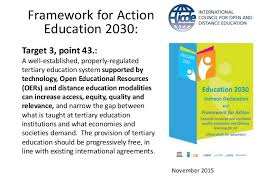The future of higher education is ‘balanced and inclusive’

African universities and entire education systems need to embrace ‘balanced and inclusive education’ to produce forward-looking graduates capable of tackling the continent’s socio-economic challenges and of adapting to changing global trends.
This was the view of experts gathered in Lagos, Nigeria, from 25-26 July for a regional conference on ‘balanced and inclusive education’, intended to gather ideas on how to achieve inclusivity and develop policies to ensure its uptake.
The meeting, hosted by the Nigerian Academy of Science in collaboration with Switzerland-based non-governmental organisation, the Education Relief Foundation, noted that Africa’s education system is steeped in many challenges and was producing many half-baked, single-minded graduates who were not grounded in quality teaching that fostered useful attitudes, values and entrepreneurship skills.
President of the Education Relief Foundation Manssour Bin Mussallam told the meeting that Africa needs to make curricula, pedagogy and classrooms more balanced and inclusive through the four pillars of intra-culturalism, trans-disciplinarity, dialecticism and contextuality.
He said intra-culturalism was a conversation taking place within a culture, while trans-disciplinarity fostered collaboration and creativity. He described dialecticism as seeking to respond to the ever-increasing necessity for critical thinking skills, while contextuality was based on constant, sustained dialogue and exchange.
Problem-solving across disciplines
“The continent needs a balanced and inclusive education premised on encouraging conversations within the same culture, solving problems across different disciplines and aiding critical thinking in local and global contexts,” he said.
Kalu Mosto Onuoha, president of the Nigerian Academy of Science, said university education needed to be tailored towards transforming and improving the conditions of both the learner and the community, and to catalyse sustainable development.
“Balanced and inclusive education has to do with the future. The whole idea is to evolve an educational system that trains people versed across different disciplines, cultures, dialects and contexts,” said Onuoha.
Onuoha said that apart from South African institutions, African universities did not feature highly on global rankings as many were overpopulated, had poor infrastructure and lacked equipment for hands-on training.
He told University World News that most African graduates, irrespective of their attaining first-class degrees, had knowledge based mainly in theory rather than hands-on experience which could expose them to the needs of the job market. “And that is not inclusive education,” he said.
“There is something about the ability to think out of the box that is not being imparted enough and it has to do with the way one has been raised to perform,” he said.
Onuoha also said there was a need in today’s world to grasp more than a single specialty and educational systems needed to draw more wisdom from local cultures.
To this end, the curricula needed to be reworked to provoke creative thinking in African universities. “For instance, Africa needs PhDs that can produce things that get patented, that can impact on people’s lives and not just excel in theories,” he said.
Entrepreneurship
He said university education was missing an emphasis on developing a spirit of entrepreneurship.
“There is insufficient enough time and space given to practical training and graduates queue for jobs instead of creating jobs, and that is something that has lingered on since the colonial times when people only thought of white collar jobs [as worthy]. Entrepreneurs are coming up but in trickles. That is missing in our education, those with entrepreneur spirit,” said Onuoha.
He urged the African Academy of Sciences to use its influence to ensure an emphasis on entrepreneurship in higher education systems.
Director of the National Curriculum Development Centre in Uganda Grace Baguma said current curricula were often compartmentalised, making the delivery of inclusive and multi-dimensional approaches in learning impractical.
“Curricula are often detached from the reality of what is happening in the world, especially in a globalised world that is bringing different cultures closer. There are gaps that must be filled,” she said.
According to Professor Ekanem Ikpi Braide, vice-president of the Nigerian Academy of Science, education is yet to receive the attention it deserves in Nigeria despite policy frameworks.
“Education for human development is at the core of the socio-economic development of any nation. If education is not given the appropriate attention, then it will be a matter of going past to the past,” said Braide.
She said the continent was lacking quality education that was meaningful to the individual, their community and to the nation. “The prerequisites for achieving balanced and inclusive education are yet to be exhaustively met,” she said.
Source: university world news